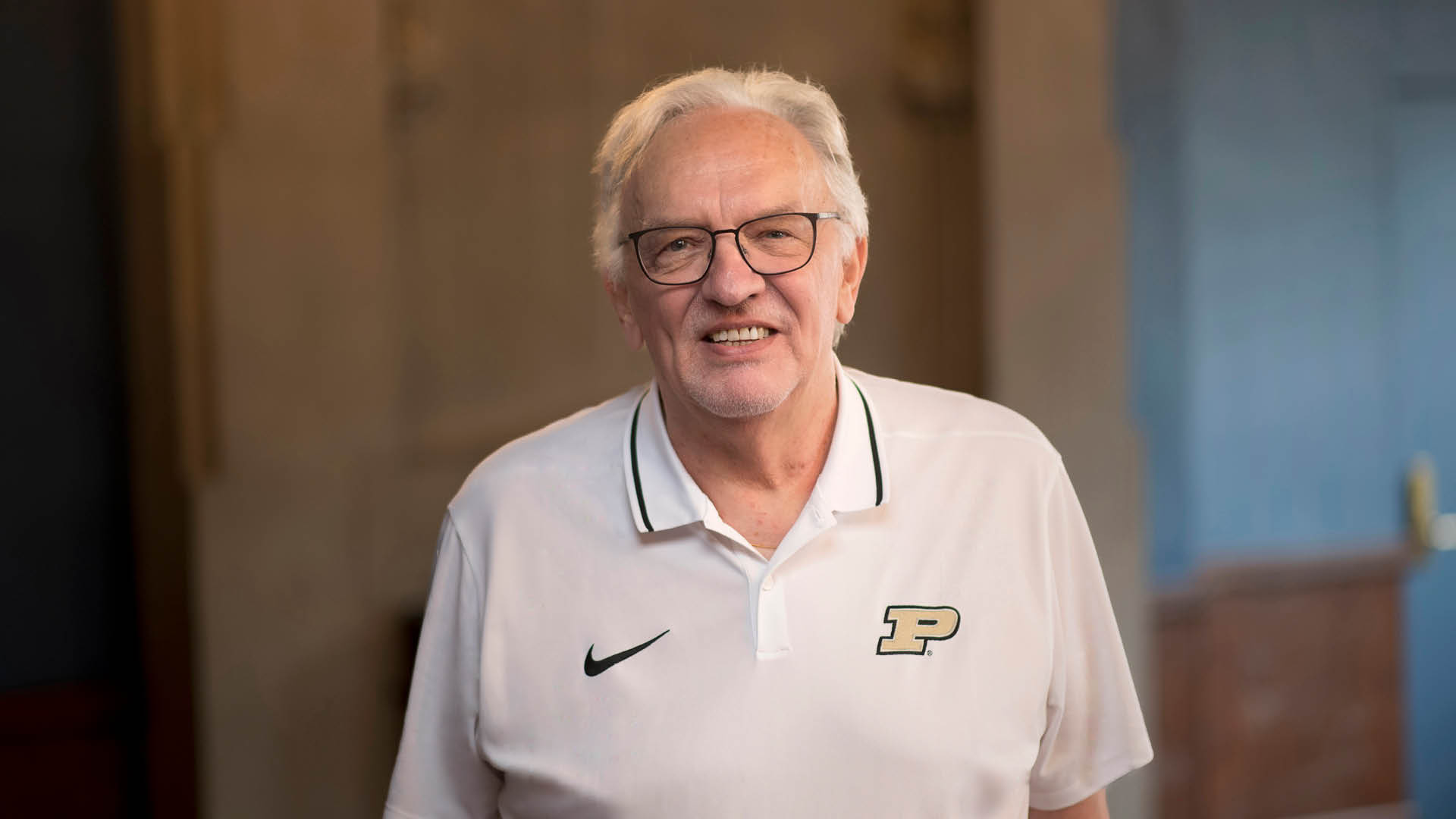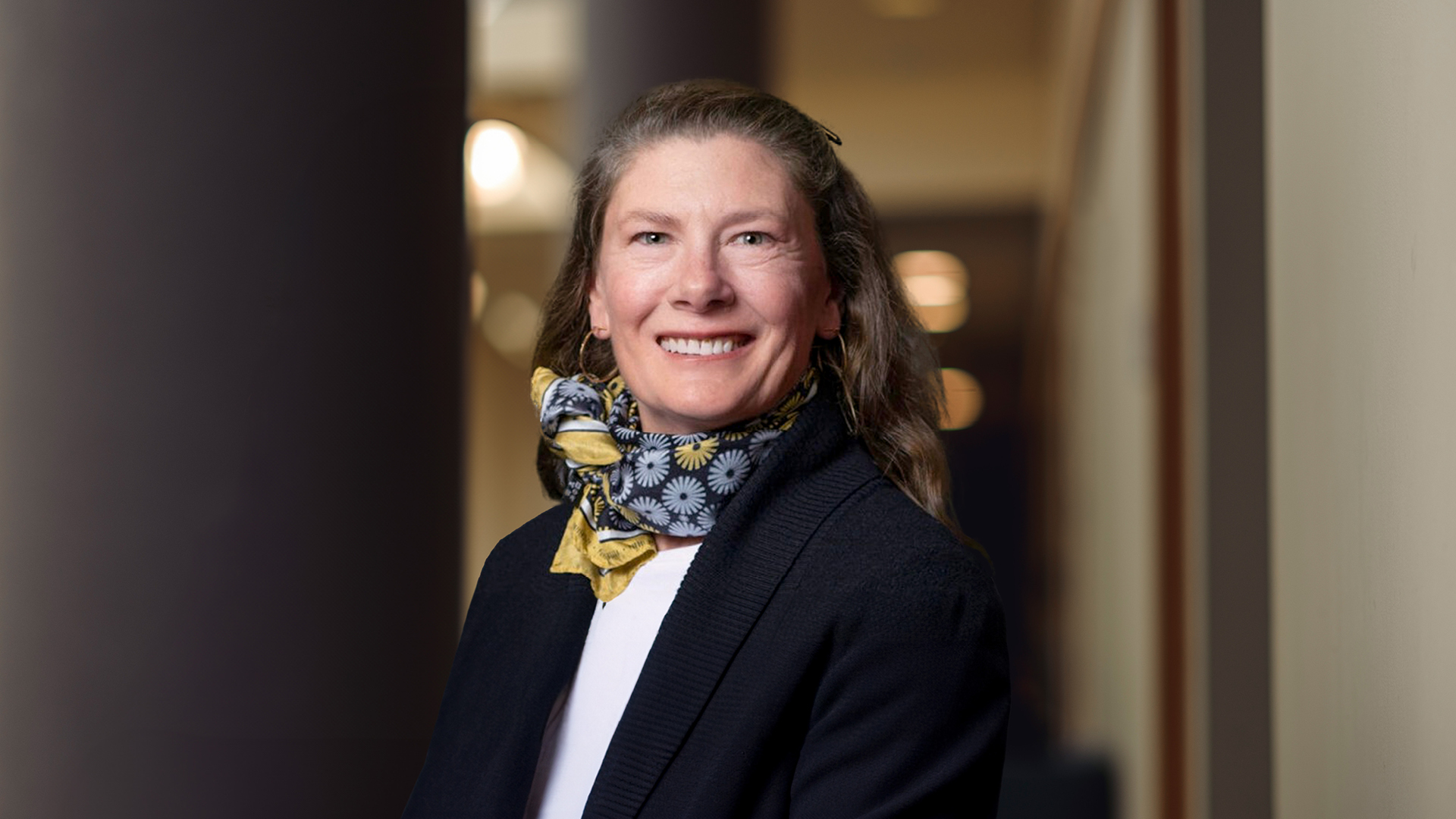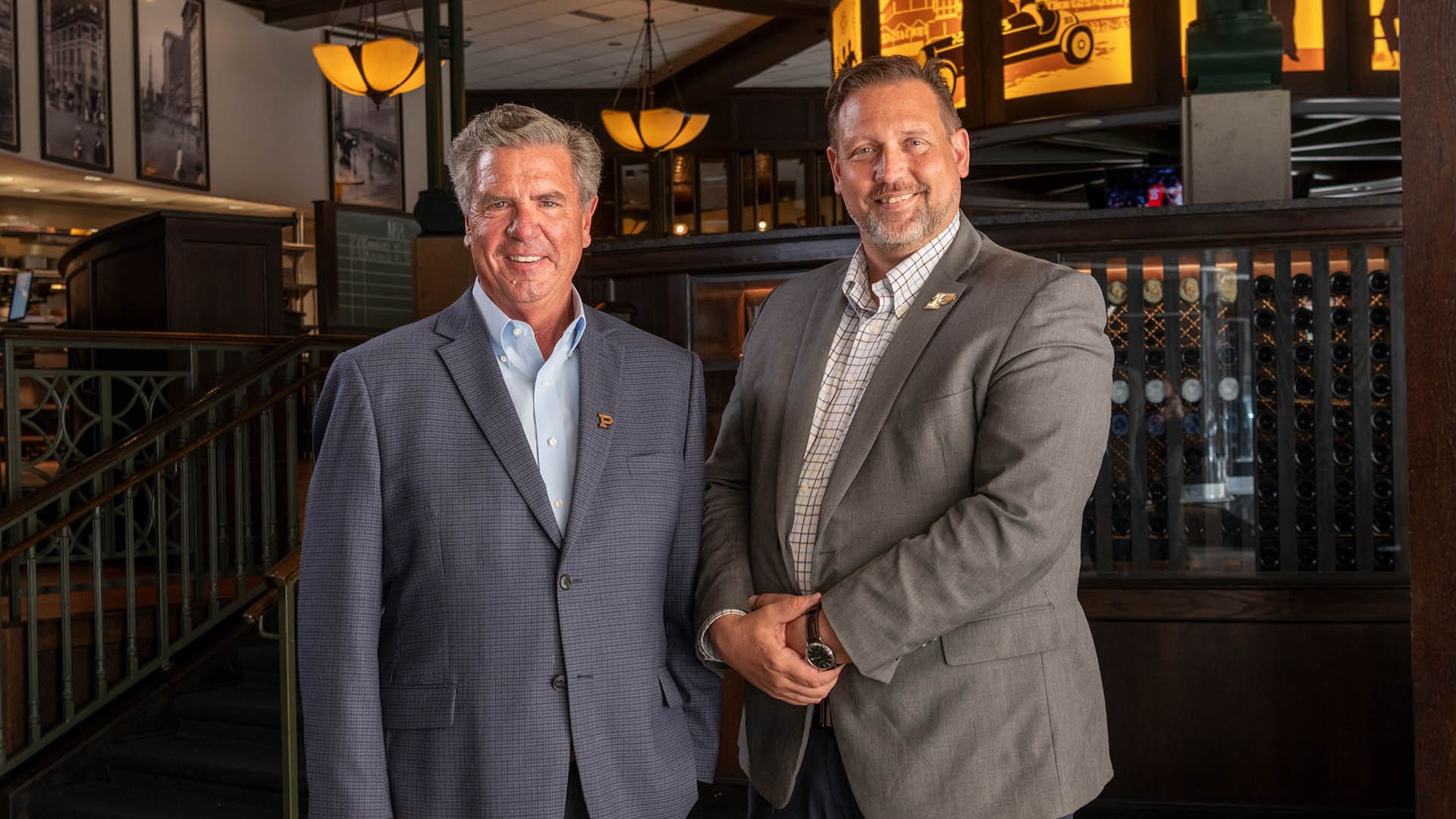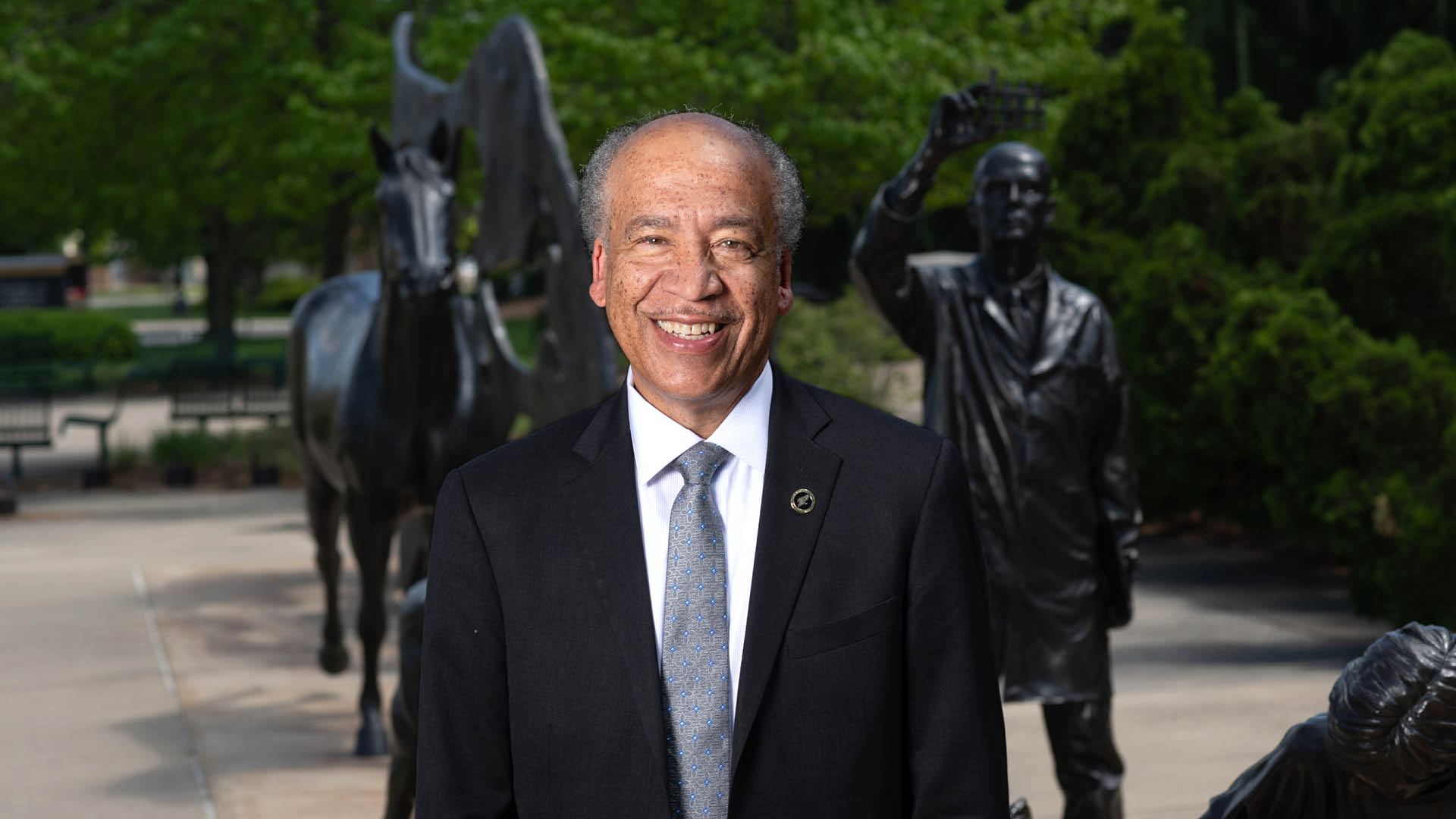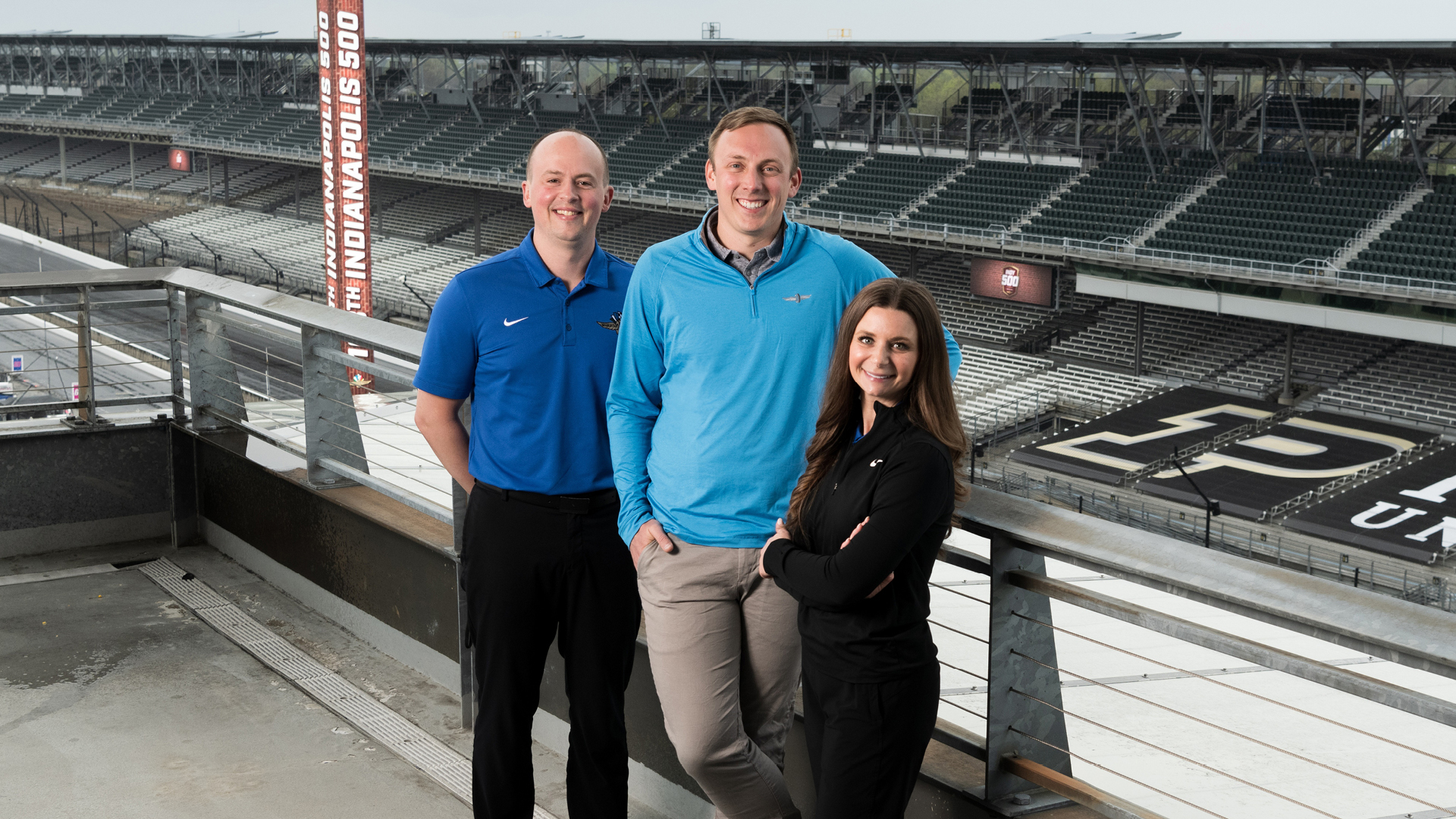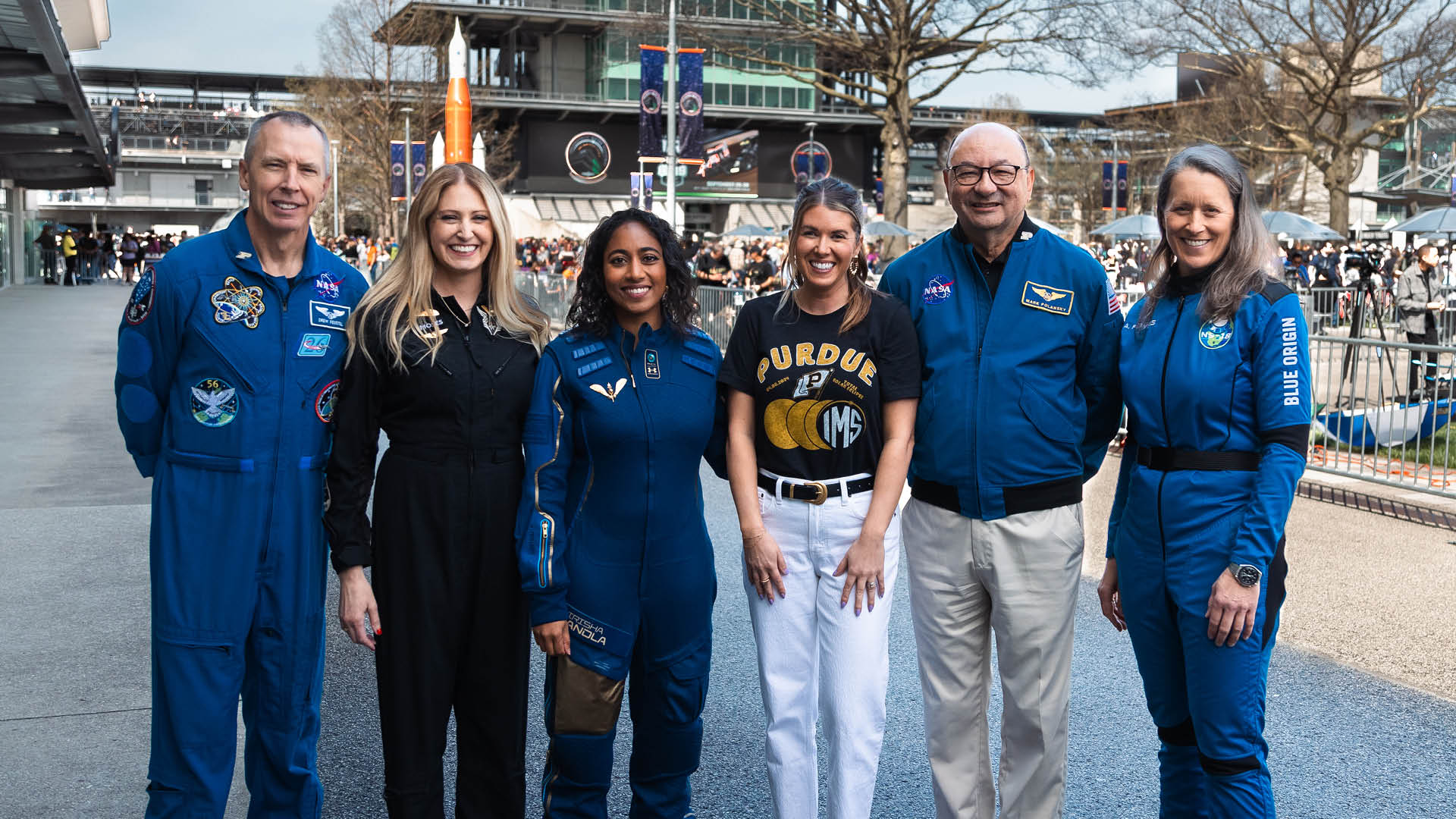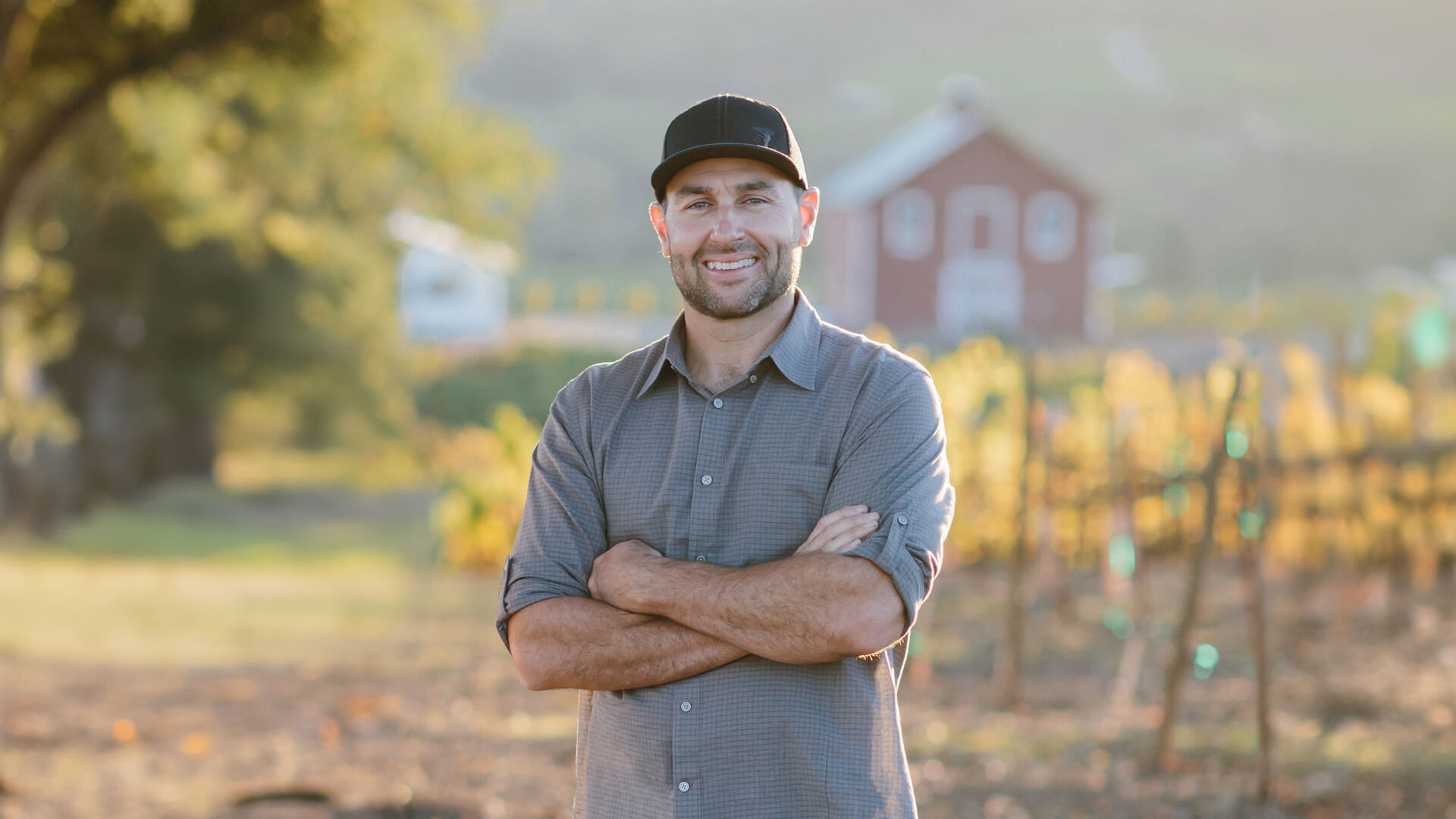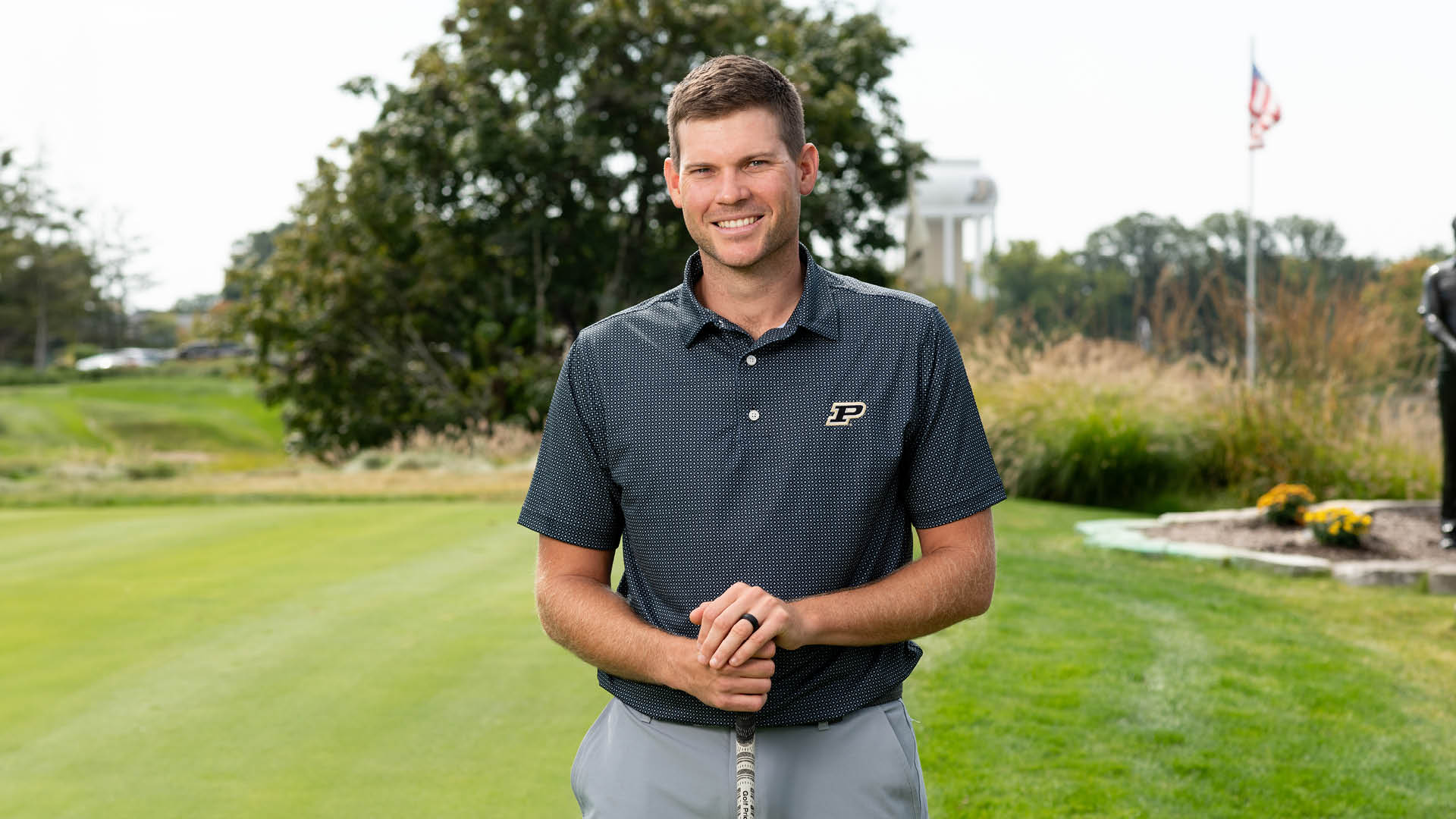Podcast Ep. 101: Ford Motor Co. HR Director Rochelle Dorn-Hayes on the Importance of Bringing Your Whole Self to Work
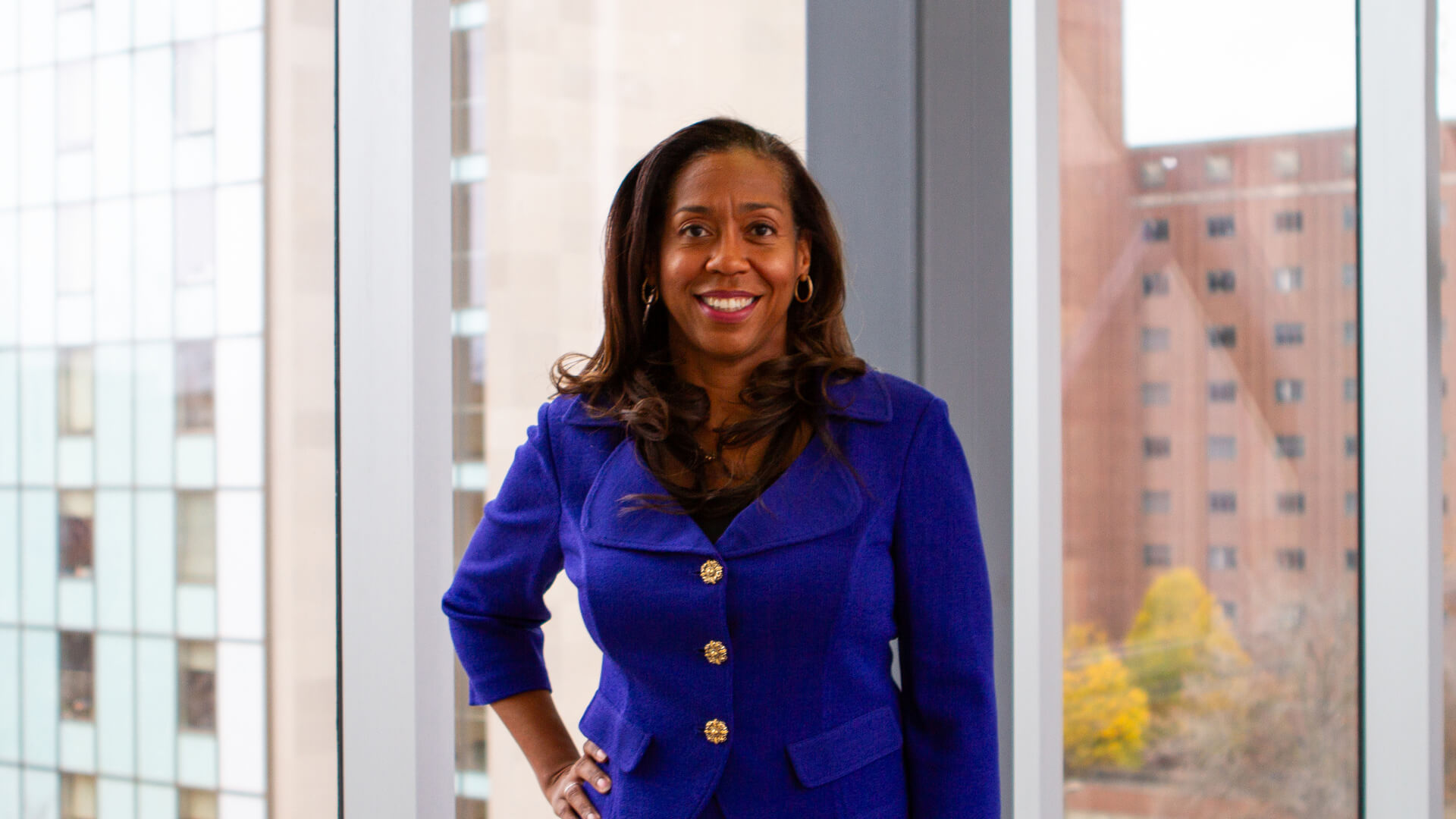
In this episode of “This Is Purdue,” we’re talking to Rochelle Dorn-Hayes, human resources director at Ford Motor Co.
Tune in as Rochelle shares more about her time at Purdue, where she earned her MBA from the Mitchell E. Daniels, Jr. School of Business. She carries with her the lessons learned from her beloved mentor, Dr. Cornell A. Bell, and the importance of providing guidance to the next generation of Boilermakers through her involvement in the Business Opportunity Program (BOP).
Rochelle also dives into her 25-plus-year career at Ford, including her work creating an award-winning diversity, equity and inclusion training program and her transition from finance to human resources.
You don’t want to miss Rochelle’s helpful insights, such as seeking out mentors and utilizing the buddy system when it comes to networking and exploring new career opportunities.
- Read about Rochelle’s work mentoring Purdue’s Daniels School of Business students
- Learn more about the Dr. Cornell A. Bell Business Opportunity Program
- Learn more about Dr. Bell
- Learn more about the Mitchell E. Daniels, Jr. School of Business
Full Podcast Episode Transcript
Rochelle Dorn-Hayes:
This is Rochelle Dorn-Hayes, and you’re listening to, This Is Purdue.
Kate Young:
Hi, I’m Kate Young and you are listening to This Is Purdue, the official podcast for Purdue University. As a Purdue alum and Indiana native, I know firsthand about the family of students and professors who are in it together, persistently pursuing and relentlessly rethinking. Who are the next game changers, difference makers, ceiling breakers, innovators? Who are these Boilermakers? Join me as we feature students, faculty and, alumni taking small steps toward their giant leaps and inspiring others to do the same.
Rochelle Dorn-Hayes:
Dr. Cornell A. Bell, he was absolutely a mentor and he taught me so, so very many things. I did not have any connection. I would say he was almost like a second dad to me. That impact that he, and I call all the BOP kids of all ages have brought back to me, and the things that I have learned and gained and continue to give back to that program, are immeasurable.
Kate Young:
In this episode of This Is Purdue, we’re talking to Rochelle Dorn-Hayes, human resources director at Ford Motor Company. Rochelle shares more about her time at Purdue, where she earned her MBA from the Mitchell E. Daniels Junior School of Business. She also dives into her relationship with beloved mentor and Boilermaker Dr. Cornell A. Bell, and the importance of providing guidance to the next generation of Boilermakers through her involvement in Purdue’s Business Opportunity Program.
Plus, we discuss Rochelle’s 25-plus year career at Ford, including her work creating an award-winning diversity, equity and inclusion training program, her involvement in Ford’s African Ancestry Network, and her transition from finance to human resources. This episode offers helpful insights when it comes to work-life balance, advancing your career, and exploring new opportunities. Here’s my conversation with Rochelle.
Rochelle, thank you so much for joining us on This Is Purdue, the official university podcast. We’re so excited to talk to you today. Tell us a little bit about your Purdue journey. You actually received your MBA at Purdue. You didn’t go to undergrad here. So, what was your experience like at Purdue, and what attracted you to Purdue in the first place?
Rochelle Dorn-Hayes:
So it was really funny, when I was finishing up law school my last semester, I was appreciating my undergrad business degree a lot. I thought, “Do I want to become in-house counsel one day? Do I want to go in the corporate world?” But I knew I wanted to use it more and I just felt like I wasn’t done. So I actually called up… I went to Prairie View A&M University for undergrad. Called up my undergraduate business dean and said, “Dr. Jones, where’s a good school? Where do you think I should go, apply to?” And she said, “Purdue.” So a couple of schools, but, “Purdue is a really great school. We’ve had a couple of our students…”
And I was in the honors college too in undergrad, and so a couple of the honor students alumni had gone there, had done really well, really liked it. I said, “You know what? I’m going to apply to work, I’m going to apply to school, and see what happens.” I got a full fellowship plus extra money, and I said, “Oh, two years not committed in the cold? What is that?” Because I’m from California, went to undergrad in Texas, and went to law school in Louisiana. So I had never been to the cold before. And I’m still living in the cold. I never thought I would be doing it, so it was the introduction to a new experience for me.
Kate Young:
Were you shocked to see snow for the first time?
Rochelle Dorn-Hayes:
It’s funny. One of my best friends in grad school, Kerry Rouser, was from Chicago, and he had gone home for the weekend and all of a sudden early one Saturday morning, he called me and said, “Get up and go to the window.” I’m like, “What are you talking about?” “Get up and go to the window.” And there was all this snow coming down. And he said, “Okay, so now I’m going to get off the phone so you can call your parents and tell them that you’ve seen snow.”
Kate Young:
That’s amazing. I know… I always have grown up in this type of weather in the Midwest, so. But I do love… I frequently talk to people who are like, “Oh, Purdue was so cold, I didn’t know what I was getting myself into.”
Rochelle Dorn-Hayes:
Well, one of my friends from high school, I will say, and I give this same advice today to anyone moving to the cold, she said, “Go to Eddie Bauer. Get a real down coat. Don’t get some poly whatever. Get a real down coat. Get some long underwear, get some gloves, hat, wool socks, snow boots, hat.” I mean, just everything real. Not fashionable, but actually practical.
Kate Young:
Not to be cute, to be warm.
Rochelle Dorn-Hayes:
Yes. Yes, functional. And I use it all the time. All the time I do it and I tell anyone who comes to Ford from down south the same advice today.
Kate Young:
Sure.
As Rochelle mentioned, she had a few other higher ed experiences, earning her bachelor’s in business administration from Prairie View A&M University’s honors college and getting her juris doctor from Tulane University School of Law before coming to Purdue. But what made Purdue stand out to her? What did this Boilermaker experience give her?
Rochelle Dorn-Hayes:
I honestly got faith in people again. My law school experience was much like you might hear in other venues, that there was one assignment everyone had and the pages were torn out of the book. That was part of my experience. When I got to Purdue, everything was in a group. And so I had study groups in law school, but I later found out everyone didn’t have the same information. Undergrad I did. Undergrad I did, but in grad school you had to work in cohorts, and I really got faith in people again.
It was surrounded by engineers, right? Because even in the MBA school, I was surrounded by engineers. It was really technically based, and that was a stretch for me, which was great. And then on top of that, we got to use our own skills. So for example, we were placed in cohorts who didn’t choose them and I had a group of friends, and each one of us in a group had friends that were experts in their group. That expert… For example, there was a CPA in one of our friends’ group. She would teach them everything accounting. He would come back and teach us.
And so we would all have our expertise and we would go teach our friends and learn that way. It was just a really great introduction into the business world, because that is what we do today. Cross-functional work all day every day.
Kate Young:
Yes.
Rochelle Dorn-Hayes:
And so this was a great introduction to that. And also to learn how to own and understand what you are an expert in. So I was acronym girl. I would come up with every combination to remember things. We would get into class at the beginning of our test and write whatever the acronym was for the day. Like, “The blue sky had four eagles in it,” and it would stand for something. And I actually teach my daughter to memorize through connections with words today.
Kate Young:
My mom is a teacher, and she did the same thing growing up. All the acronyms.
Rochelle Dorn-Hayes:
Yep. Word association works.
Kate Young:
Now Purdue’s very own Dr. Cornell A. Bell, the first director and chairman of the Business Opportunity Program, had a huge impact on Rochelle’s life both during her time at Purdue and after. The Business Opportunity Program, also known as BOP, was founded in April 1968 to broaden student access to a world-class management education. The program was one of the first and most successful of its kind at a major business school. Then-dean John Day hired Dr. Bell to run the program during its second year.
Under Dr. Bell’s leadership, BOP grew into a nationally recognized program that recruits, enrolls, educates, and provides support for both undergraduate and graduate students pursuing management careers. And over the years, BOP has provided opportunities for more than 1400 undergraduate and graduate students. Rochelle shares more about her relationship with Dr. Bell and her experience in BOP, and what this program meant to her and continues to mean to her throughout the years.
Rochelle Dorn-Hayes:
Dr. Cornell A. Bell, he was absolutely a mentor. He taught me so, so very many things. I did not have any connection. I would say he was almost like a second dad to me. That impact that he, and I call all the BOP kids of all ages, have brought back to me, and the things that I have learned and gained and continue to give back to that program, are immeasurable.
Kate Young:
Yeah, I want to talk to you about BOP. You’re still involved, it’s clearly near and dear to your heart. We had Shawn Taylor on-
Rochelle Dorn-Hayes:
Yes, yes.
Kate Young:
… and he said the same thing about Dr. Bell, and we’ve heard so many wonderful stories. So dig a little bit deeper into that. Why are you so passionate about the program? What does it mean to you to help support other Boilermakers within BOP too?
Rochelle Dorn-Hayes:
It’s interesting. Dr. Bell changed the way that I thought… Well, background. I didn’t have, and my family didn’t have, any background in the corporate world. My mom is a nurse, my dad was a judge, so we had law, we had medicine. We didn’t have anything to do with corporate world. I didn’t know anything about it. I always thought of school and institutions as learning and books, but Dr. Bell took it to another level. And I remember even during orientation week, someone in the class above me…
So Dr. Bell, his name was on my fellowship statement letter. I didn’t know who he was or anything, and I was like, “Oh, okay. This is awesome. I got a fellowship, this is cool.” Andre in a class ahead of me had said, “Have you met Dr. Bell yet?” I’m like, “No. No, I haven’t met him.” “Oh, let’s go to his office.” And I’m like, “You can just go to his office?” “Yeah, what are you talking about?” And he was looking at me like I was crazy. He said, “Yeah, we’re in his office all the time.” “During office hours?” “He doesn’t have office hours. Just the door is always open.”
So we go, and there were a bunch of students in there, and he knew who I was. “Attorney Dorn! How are you doing? I finally get to meet you.” And I’m… “Who is this person who knows everything about me already?” And he’s already studied me. He knew about my background. I think he had talked to my old business school dean after I was admitted. And I think he had asked other… There was another student in the class ahead of me who went to undergrad with me, and so he had told him about… He knew all about me already. “What? What is this?”
And that was the introduction just to a change in my thinking, I think, of higher education. We would pop in his office at night. He would come in on Tuesday mornings and leave on Thursday evenings going home. So he would be in there in his office late Tuesday, late Wednesday, and depending if there’s something else, even late other nights. “Oh, perfect. I have a phone call about to make to someone in California. Why don’t you talk to them and tell them about your experience here at Purdue?” “Okay.” Or I would be in his office and someone like Shawn Taylor would walk in, or someone like Roland Parrish would walk in, and I’m… “Wow. These super accomplished people are coming in and just giving me invaluable words of wisdom, just sitting right here talking to me.” It just was amazing.
And my parents always had given me the gumption to always give back. I always give back to the community. But this was giving back on a different level. Handing back, giving back, continuously wanting to help others. Recruiting, I think of differently. Before, it was going to a job fair and meeting these strangers and just trying to get a job. After that, I looked at it as Dr. Bell’s kids coming back to give opportunities to other people.
And that is how I think of recruiting today. I look at it as an opportunity to help others get ahead in life. There is enough to go around. There’s no need for anyone to feel stingy. There’s no need to hide any secrets. Any way I can make easier for someone else, or if I can give an opportunity to someone else so that they can succeed, I am all for it. And he was part of that journey.
Kate Young:
Rochelle recently came back to Purdue’s campus to host an executive forum for the Daniel School of Business in November of 2023. During the second year of her MBA program, Rochelle was a teaching assistant for the executive forum, so she said it was really a full circle moment for her.
Rochelle Dorn-Hayes:
When I just came back for the executive forum, for example, my hosts for the couple of days that I was there, whenever I was talking to a group of students and they said they were finance and they were juniors, I’m like, “Wait, do you have a internship yet? Have you applied to Ford? Here’s the link. Do you need the link? What questions do you have?” And so any time I can provide an opportunity for someone to show themselves, for someone to be their best, I’m willing to do it.
And still involved with Darren today. For example, couple years ago, our finance team did mock interviews for Darren Henry’s class. It was great, and they were great. Some of the best interviews that I have heard, period, and they were freshmen. So that just…
Kate Young:
Wow.
Rochelle Dorn-Hayes:
A lot of them had not had anything beyond volunteer experience. Some of them had had jobs, like at Panera or at a fast food place, but he has developed these kids … they were… And I was telling his classes too, really utilizing all of your experiences and translating that into the business world.
Kate Young:
Currently at Ford, Rochelle continues to champion for Boilermaker students through her recruitment efforts. She also says programs like Ford’s African Ancestry Network, which was founded in 1994 and is committed to building a group that would be inclusive and impart a sense of community among all employees in the company, can make a huge impact on younger interns and employees’ experiences at Ford. A big takeaway here? Rochelle believes nobody should ever be afraid to ask questions.
Rochelle Dorn-Hayes:
I am active in our Ford African Ancestry Network at Ford. Even though I’m not in finance anymore, I’m still involved in finance on our advisory board. We have buddies, not just within FAAN, but overall within finance. A buddy that can ask someone anything. So when you first get to the corporate world, “Is it okay if I wear these clothes? Do I sound stupid?” “No, never.” Always want to be a resource for someone to help them get ahead. And I’ve actually been recruiting since the day I started at Ford.
So at first it was with Purdue, then it was amongst all of broader finance. I am now the Prairie View champion for Ford. And so I just always want to continue to, any time someone new comes in, try to mentor them, give them advice, be open so they can IM me and ask questions any time. Because I think that’s one of the biggest barriers, that people don’t know and don’t know who to feel comfortable asking questions to.
Kate Young:
Yes.
Rochelle Dorn-Hayes:
I am always happily available to our students to do that.
Kate Young:
Rochelle interned at Ford Motor Company the summer after earning her MBA from Purdue, and landed a full-time job by the end of that internship. Her first assignment? Working at a manufacturing plant in Chicago. Rochelle shares a few examples of what her first experiences were like working for Ford, and discusses some of the lessons she’s learned along the way and still carries with her today.
Rochelle Dorn-Hayes:
It was dynamic, because you could see how Ford operated from the ground up, literally, and it was a stamping plant, so there were stamping body parts. It wasn’t the flashy assembly plant that was up the road, it was the stamping plant. But it was great to see all of the different things. And one of the, I think, most impactful times, half way through the summer in July and December, all of our plants have shut down. So they might retool, they might have different things that they’re working around, but production is shut down. When they came back up, productivity was not quite where they wanted it to be. So they came in the controller’s office and they said, “Each of you take a couple of lines, do a report for us every day, and let us know what we can do to make this productivity go up.”
I go down the floor, I don’t know anything, and I’m letting them know. And I think that was the first… and I still use it today, the first real lesson to myself in, appreciate everyone where they are. Appreciate everyone’s expertise. Understand that there are errors you might not know anything about. They do. So I went on the floor and I said, “Okay, I don’t know what you do, but I’m here to help you. Upstairs they always tell us what to do when they don’t listen to us. I’m telling you, I’m here. I’m going to do it. Here’s my paper, here’s my pad. What is it that we can do to help you when you come in tomorrow?” “Well, it takes us about half an hour to get the racks here ready for our parts.” I was like, “Okay, so if the racks are here, that’ll help you?” “Yes.” You write that down. And there were a couple other things.
And then I went to the other line, and the line, it wasn’t moving. Now this was back in 1997, so there weren’t many women on the floor or in that plant at all. And I have to say, I had to use my mind and what would work, because they’re all looking at me kind of crazy down there anyway. I’m like, “Excuse me, is this supposed to be moving?” And so he’s like, “Well, yes it is.” And I said, “Okay, so I’m here. I’m working with the area manager. I’m supposed to write down what time it stopped, what time it gets back up, and what was wrong with it. Can you help me?” He was kind of looking like, “Do I really need to get up?” I’m like, “I really need your help.” And you always catch bees with honey and not vinegar, right?
Kate Young:
Yes.
Rochelle Dorn-Hayes:
So use honey not vinegar. Then he got up, fixed it, started running. It stopped right away. And I said, “It stopped. Is it supposed to do that?” And then he’s like, “No, okay,” and he fixed it. And I said, “Well, what was wrong with it?” Wrote all that down, gave it to the area manager.
The next day, he had racks waiting there for that one line. So he said, “Wait a minute, you were telling the truth!” And I’m like, “I told you. Okay, so what else can I do for you today? What else do you need?” “Well, we have to take more breaks, because we need some more pads on the floor down here. Could you get some more pads?” So I’m writing all the things down. And I said, “You know your job. You know what works best for you. I don’t know that.” So did all that, and then went to the other line.
By day three, he saw me coming. “It went down at this time, we got it back up at this time, and this is what was wrong with it.” And I carry that through today. Make sure that you respect everyone, no matter what level they are, no matter how long they’ve been there, no matter… Everyone has experiences that they bring to the table that are valuable. Realize that, understand it, learn from each other and grow together.
Kate Young:
Rochelle walks us through her career journey at Ford, from starting in finance and compliance to where she ended up today in human resources. And as you’ll hear, she’s had a lot of different experiences throughout her 25-plus years there.
Rochelle Dorn-Hayes:
Ford has been really great in entertaining my desires to use what I call both sides of my brain. So utilizing the law side, using the finance side. And so I’ve had a lot of positions that have granted me bird’s eye views of the company, not just in a silo. Just been really fortunate to… I think in a lot of positions, maybe a lot of people might not have wanted, but have been very beneficial.
So I was in the general auditor’s office, for example, and so I audited a lot of different areas including corporate staffs, including HR, including marketing and sales, including pension asset management, including [inaudible 00:21:54], so a lot of different areas. I’ve been in a couple of other control-related positions, where I looked at it not as just someone doing testing, but as an internal consultant, and really took that to heart and worked with our global directors on a lot of unique solutions.
And so within corporate staffs, HR was one of those. So I really was getting involved with some of the operations back almost 10 years ago. Beyond that, I’ve been in contract review in the treasury department, so all non-standard contracts that had risk and indemnification language, and I had to review and approve that language. And so once again, I was working with so many different areas, including some related to HR, related to sponsorships, related to just a lot of different things.
Kate Young:
Ford Motor Company gives its employees 16 hours per year to volunteer during work time, and Rochelle said her love of volunteering, both within Ford and outside of Ford, was instrumental in the ease of her career move from finance to HR. She’s held various leadership roles and participated in numerous local and global community service projects with her sorority, Alpha Kappa Alpha Sorority Inc. Rochelle said her sorority helped her gain confidence in so many different aspects, such as public speaking, networking, and presentation skills. Rochelle discusses several of the volunteer opportunities she’s involved with at Ford, including the creation of an award-winning diversity, equity, and inclusion training program.
Rochelle Dorn-Hayes:
I volunteered the whole time. So like I said, I’ve been in recruiting this whole time. I’ve been really active in diversity, equity, and inclusion. I actually led the creation of DEI training that all of our US finance team had to complete a couple of years ago. Award-winning, I might add.
Kate Young:
Amazing.
Rochelle Dorn-Hayes:
Yes, yes.
I’ve been involved with minority dealer operations in some of their internship program, helping create a certificate program at Arizona State University. So I’ve always been involved in these different types of volunteer experiences. And even when I was a project manager in treasury, one of the things I helped create or bring about was electronic pay via a pay card type of solution for hourly employees. And so I was very involved with UAW negotiations with that, with our labor office, with accounting, so a lot of cross-functional types of projects and relationships that I’ve developed over the years.
We also have jobs online. So this job came about and I looked at the qualifications and I’m like, “I think I’ve done all of these things.” And so I applied and got this position, which I loved. And I was amongst some of the most talented people in the world and that were just experts in their field and soaked in everything, and I had just a different perspective. I was even able to contribute from day one, with all of my expertise and perspective, just a different point of view.
Kate Young:
I love that perspective and advice. Because Rochelle has had so many different unique experiences within the same company that required all sorts of skill sets, she was able to earn different job opportunities than if she were to just work in the same area for decades.
Okay, so being in human resources, I knew Rochelle would have some great insight on work-life balance. It’s a topic we’re hearing a lot about, especially the last few years. It’s all over LinkedIn. How can we balance our families, friends, hobbies, personal lives with the demands of our careers? It’s also timely as we hit February and your New Year’s resolutions on checking your email less at night or going for a walk at lunch and shutting down your Teams app, or starting your morning off with meditation, may be dwindling and losing some steam. So I asked the expert herself.
Rochelle, we’re recording this in early January. It’s the time when people are either making New Year’s resolutions or maybe they’re already made. What are three work-life balance tips that are actually realistic if someone’s resolutions have to do with that work-life balance, spending more time with your family, mindfulness, all of that good stuff? Give us three tips.
Rochelle Dorn-Hayes:
The first one, take care of yourself first. Absolutely positively, that is what I would definitely say. If you have to schedule time for yourself in the morning before the house gets crazy, absolutely do that. Meditate, work out. Think of what you’re going to do for the day. And with that, an illness, I just want to just say it, throw it in there, don’t go to work sick.
Kate Young:
Yes.
Rochelle Dorn-Hayes:
If you want to make the most unproductive week, month of the year, go to work sick and get all your coworkers sick. And so that is, take care of yourself, and if you do get sick, stay at home.
Second, plan as much as you can, so when emergencies or things that you don’t know are going to happen, you are ready. The biggest tip? I know they say separate work and home. No. Put all of your work and home things on one calendar, so that way you can say, “Oh, I have this award ceremony coming up. Let me block this off of my work calendar.” If you can’t make it to either work or the personal thing, you can have somebody else step in.
Finally, get an accountability partner for yourself. Whether it’s working out, like, “Did you work out today?” or “Let’s take a walk around the building at lunch,” or it’s even at work, “Did you put that pickup time on your calendar and block it off on your calendar? Because you know you’re going to do that.”
And so those are my top three. And then finally I just want to say, be easy on yourself, because even Superman had their kryptonite. And so if at first you don’t succeed, try, try again. So my quick tips for 2024.
Kate Young:
If you want to catch those three tips again, we have this video posted on our podcast YouTube page. Head over to youtube.com/@ThisIsPurdue.
Rochelle’s Boilermaker persistence and determination throughout the years have fueled her successful career as a woman in leadership in the auto industry. So what advice does Rochelle have for other women who want to learn, grow, and advance in their careers?
Rochelle Dorn-Hayes:
First of all, I would say seek mentors. Mentors, buddies, people to bounce things off of. Career advice. And they don’t have to be other women. You can have allies of all kinds. You want to know and understand what the people at the table are talking about. You want to know how you are perceived. You want someone to be honest with you and tell you, “These are your great assets. These are things that you can improve upon,” and not feel sensitive about that, in order to grow. You want an ally that can let people know, “This person is great with this. This person would be great on your team.” Someone that can open your eyes to different things.
I actually just had a colleague say to me, she had known a couple of the women that she’s working with now earlier in her career, because she might have had a different pathway. Now this is someone who is controller of an entire new area that we have, has worked in Dubai for Ford. She’s amazing in herself. But she has said she wished she knew some of the other women that she’s working with right now, because they have had such vast experiences, and they’re just women bosses, you know? Just really neat to have.
But I would just say, make sure you get an ally. Start meeting people. We’ve had interns, and I tell some of our interns that I work with, schedule one-on-ones with as many people as you can. One of the things that Ford is great with, they love interns. They love entertaining interns, they love listening to them, giving them advice. Utilize that. There was one intern and she shadowed me for half a day. She’s now a full-time employee. She had an entire slide in very small font, with I don’t know how many columns of people. She had one-on-ones that she was able to show at the end of her internship. All of those experiences were invaluable. And I’ve done the same thing to a couple of Boilermakers, actually. “Who would you love to meet?” For example, “In finance, who would you want to work with? What’s an area you might want to work with in the future?”
And Michael Lewis, he’s actually a Ford employee right now, he said Ford Credit, marketing and sales, and I forgot what the other area was. And so I got him a one-on-one with Marian Harris, who is currently the CEO of Ford Credit, and Brian Schaaf at the time, he’s retired now, but he was CFO of Ford Credit. And Tim Baughman, he’s now general manager of Ford Pro, but at the time he was a controller of marketing and sales. And it was really cool, because he had this one-on-one with him, and then he said, “Schedule another one-on-one with me in two weeks.” And within that time, his new role had come out. He knew it was coming, but it hadn’t been announced yet. And so he got to talk to him again in his new role with Ford Pro.
And so I would definitely say ask. Just ask, don’t be afraid to ask. And get those allies, mentors, networking. Don’t think of networking as a task, but just think of it as, “I’m learning and growing.”
Kate Young:
I love that, because I think a lot of people are intimidated by networking. Nobody wants to walk into a networking event by themselves.
Rochelle Dorn-Hayes:
No.
Kate Young:
But you’re giving us other ways that we can network.
Rochelle Dorn-Hayes:
Absolutely! And then if you are afraid, always find a buddy. Always find a buddy and a friend to do it together. If you’re afraid to do it, do a two on one. “Hey, do you want to do a two on one?” Or, “Hey, can we do a two-on-one lunch?” Or if you see… Ford has lots of activities and clubs and just opportunities and networking groups, employee resource groups. Grab a buddy and say, “Hey, want to do this together?” “Okay.” And I’ve been there 26 years. I can’t believe it. I like to joke and say I started when I was five.
Kate Young:
Yes.
Rochelle Dorn-Hayes:
But even now some of our friends like, “Hey, are you going to this?” “Hey, I’m going.” And we don’t need them to go, but we still like, “Hey, are you going? Come on, let’s go.” Have an accountability buddy, that’s what I talk about all the time, and, “Don’t let me forget to go to this. I want to go to this. Don’t let me forget.”
And so keep those networks. If you’re an intern, get a chat group of all of your interns. You might help each other, even with your presentations, and think of it… You are the future. You’re coming out of school. You have some of these new skillsets and technology that can help the groups today, and so you can contribute to the bottom line of the company while you’re an intern in those 12 weeks. It doesn’t have to be Ford or any company. You can make a difference today. And just make sure you know that, you realize that walking through the door, and you offer that up. Don’t accept if someone says to you, “Can you run 10 copies?” Okay, you might have to run the copies, but ask for more. Look at the copies and like, “Hey, I have a question on these presentations. What is this about?”
And just schedule time to sit and … to a mentor, a boss. Ask, “Who else do you think I could talk to that might know about this? I’m just curious or nosy about this.” One of the best things is a curious intern or a curious new employee, and we’d love it. Don’t be afraid to contribute. Don’t be afraid and think that “What I’m going to be saying is dumb.” That psychological safety is there. Or you’ll find out very quickly if it’s not, and then if it’s not there, then you want to ask yourself, “Is this somewhere where I want to work?”
Kate Young:
Okay, so picture this. You are interviewing for a new job. The role is exciting to you and the company seems like a great fit, but how do you get a good sense of what the company stands for and what the workplace culture is really like from just a few conversations? I asked Rochelle what she thinks is important to ask in a job interview. Plus, she shares a vulnerable personal story that highlights why it’s so incredibly important to bring your whole self to work, whether it’s a good day or a bad day.
Rochelle Dorn-Hayes:
I think it’s important when you’re in that interview process to start asking, “Do you have employee resource groups? What resources do you have for your employees?” For example, if they’re going through a stressful time in their life, is there assistance? Is there help? Because what do we say these days? Life lifes. Life lifes you. Life is always life-ing. And we all like to put our best fates forward at all times, but real life happens, and regardless, you bring your whole self to work. You might hide it behind something, but you bring your whole self to work. And so you want to be able to know…
For example, I went through a divorce earlier this year. I had a divorce [inaudible 00:36:15] last year and this year, and I had the best boss ever when I was going through it. But it’s something that I was able to say, “Look, I’m not having a great day today. I’m signing off. I’ll get back on later on.” And it’s not something that was a stain on me. It is real life. Or, “I have to go to my daughter’s award ceremony. I have to go to her cheerleading event. I’m leaving now, I’ll be back online later, and whatever it is, drop me a note. I’ll get to that and I’ll have it for you in the morning.”
Now, there are legal rules in the aid interview that you don’t necessarily want to volunteer certain things. You don’t have to volunteer certain things, but I think it is important for you to start to ask those questions. “Do you have employee resource groups?” Or “Do you have resources for employees?” Or “Do you have networking opportunities?” Just different things. And look at that personality of your interviewer and who they might pair you up with later to ask questions, and are they hesitant to answer questions or certain questions?
I think it’s also important, even just look online. Really take a look. The National Black NBA conference is one of the many places where we recruit. It’s interesting when you’re interviewing and talking to people all day long, and you can see a difference in people who truly wanted to work for Ford, for an automotive company, who has done research, who understands our advancements that we’re doing with mobility, who sees our advancements with sustainability, who has seen all different things. And whether someone like, “I just want a job and I just want to work.” “Okay.”
And so you’re not prepared to ask those questions. You’re not prepared to go in and see these things. You’re not prepared to understand what the mission is of the company, what things are important to them. And so that’s another reason why you don’t want to research just to look good for the interviewer. You want to research so you want to know if that’s a place where you want to be. But start doing that research and looking and seeing if you can talk to someone, seeing if you know someone else who has worked there. See if you know someone else who has had experience with that company. You’d be surprised at, if you start asking the questions, how many people would be willing to give their observations.
Kate Young:
For Rochelle, persistence means…
Rochelle Dorn-Hayes:
It is “Keep going.” And I think that’s been persistent, consistent, throughout my career.
In the beginning when I was going back, I said I wanted to go back to school and I was studying for the G GMAT my last semester of law school, everyone’s like, “I can’t believe that you’re going back to school.” And I’m like, “Yes, I am going back to school. It’s okay. Whatever.” It was so funny because I just kept on, I just kept on, I took the test, I got in.
The end of my first semester, beginning of second semester, I started getting the phone calls. “You are so smart. I don’t like my job, but now I bought a house, I bought a car, I got married. I can’t go back to school. You now have options that I don’t have.” So that was kind of in the beginning. Or even me taking the different positions at work that, “Oh, you’re not going through this traditional finance track?” “Well no, but you also have a different background that I have.”
So it was just kind of being persistent and being consistent with the things that I had a vision about. I think a lot of other people didn’t see that vision, but I had that vision and wanted these different experiences, and have had some of the coolest, unique experiences than I think a lot of my colleagues have had.
And now looking at some of the other positions and the growth of the automotive industry and the change in the automotive industry, I think that background now leads toward that diversity and those type of experiences. Everyone is not going to be a fan of your path, but you have to think of those things that are going to make you satisfied, that are going to make you happy, that are going to be best for you, and just keep that in mind. That’s persistence.
Kate Young:
I mentioned to Rochelle that the shift of the younger generation switching jobs and even industries more frequently than maybe our parents’ generation did within their careers. To put it simply, many people are no longer staying at the same company for 30 or 40 years. They want more of those well-rounded experiences they can gain from working in different roles in different industries.
It’s almost like you weren’t afraid to get out of your comfort zone and take those leaps. Because people would tell me, “Why are you going on that track now? Your degree was in…” I used to work in a newsroom as a journalist, and so I had to pivot a lot and take leaps of faith, I guess.
Rochelle Dorn-Hayes:
Yes, absolutely.
Kate Young:
I love that you shared some of that.
Rochelle Dorn-Hayes:
And think back. So even though you might have been in those experiences and the startups that didn’t succeed, think of what you gained from all of those experiences. So you didn’t sit somewhere and just kind of fall off the face of the earth. You gained with every single one of those experiences. And that’s what I like to tell everyone. Remember all your experiences. And you learn from everything, including failures, your own failures.
Kate Young:
Yes.
Rochelle Dorn-Hayes:
You learn from everything. My last boss said… We were talking about psychological safety. One of his most successful teams was the one where at first they had the biggest failure. The key is to learn from that and take what you learn and move that into the next phase. That would be my best advice for you. Take those risks, take those challenges and those things that might not feel comfortable to you, because that’s how you move ahead.
Kate Young:
And what is a great example of a challenge Rochelle had to recently overcome as a woman in a leadership role and a mom to a young daughter?
You know, we’ve talked about overcoming challenges being a woman in a really big leadership role. Do you have a specific challenge that you’ve overcome? You talked about your divorce. What is something that you faced that you persisted and you overcame it?
Rochelle Dorn-Hayes:
That was definitely one of them, and most recent. My daughter’s now 11, and so here she was transitioning into middle school. And being a single mom, and my family is mostly in California. I don’t have any family in Michigan except for in-laws. And so that has been kind of wild, I would say, kind of wild. And really making sure that I take time for me. Just like they say on the airplanes, that you have to take care of yourself, put the air mask on you before you put your air mask on your child? That is what I have had to make sure that I do. Before she gets up in the morning, I meditate and I get on my Bible app and I work out too if I’m able to, or sometimes during lunch if I’m working from home. And those are things that when I was married, honestly, I would often push to the side.
And I email her dad like, “These are options. She’s got this performance, she’s got this meet. Can you go to this?” He has a prominent position, he’s not able to go to a lot of her events, and so I don’t want her there by herself, so I have to make sure that she does that. And so does that mean that my schedule is crazy? Absolutely. Is it worth it? Absolutely. And that is just something that I’ve worked around, and have been comfortable telling my team and have been comfortable telling my workmates that. I think at the beginning of the divorce, I think anyone would have that kind of shame like, “I failed.” And to get over that and say, “Look, I’m going through this and this is my new normal now, and I have to schedule this. I have to take her to school.”
When I started the chief of staff job, it’s global leadership team, my boss was in the UK. I had team members in China, India, Germany, New York, North Carolina, Miami, Cincinnati, Indiana, and Oregon, and just two of us in Detroit. And I had just different hours that I was working with them, meeting with them. We had a 7:30 AM team meeting often. My daughter’s school does not open until 7:30 in the morning. So I would drop her off, get her there at 7:30, sit in the car with my laptop and take my meeting, and then drive home at eight o’clock.
It’s those creative types of things that I’m open to game for. She has gymnastics class or she has dance class. I am in the parking lot… Especially during that Covid time, I was in the parking lot with my laptop taking a meeting. “What’s that noise?” “Oh, it’s raining. I’m sorry. You can hear the rain.” Or then the camera would be on, “Where are you now? I’m outside the dance class.” I’m like, “Okay.” And they would just kind of “Okay” and move on and take care of business. And so it was learning how to voice my needs, and also letting people know, “I can still do it. I’m just not going to be during this timeframe.” And then it was learning just how to be comfortable with myself, my new normal, and letting everyone know that too.
Kate Young:
I asked Rochelle how her Boilermaker experience helped tee her up for all of the success she’s experienced throughout her career at Ford. And for her, it really all comes back to the teamwork and friendships she experienced through BOP.
Rochelle Dorn-Hayes:
I enjoyed being a Boilermaker, one, from the lifelong friends that I have gained. One of the things that I did before I was interviewing for the chief of staff job, one of my classmates, Jeremias Henderson, that was one of my study buddies, I called him up and he’s been a HR professional… He got his master’s in HR, he was an HR professional his entire career. And I was like, “I’m interviewing for this job! Help. What are the things that you think would be great for me to say and do?” And then what he did was let me know, “You know some of the greatest HR professionals have finance in their background?” Those things. And he was one of those Boilermakers, had that Boilermaker spirit to make you look at yourself and look at those things that make you shine.
The Boilermaker spirit is persistence. Being strong. Not in a stubborn type of way, but being strong and persistent. And all of my classmates, like I said in the beginning, we taught each other things. We were giving. We were in this together. Even going to Harry’s, we were in this together. Even the night of graduation, that later on that night, we did our fountain run.
Kate Young:
Yes.
Rochelle Dorn-Hayes:
We were in this together. But throughout the entire time I was there, we were in this together. And we can reach back to those friendships and those connections and able to still help each other, just like the BOP family. That is that true Boilermaker spirit. We are there for each other. We are helping each other go along, just like in that Boilermaker train. We are moving it along, definitely.
Kate Young:
I love that.
As for Rochelle’s next giant leap, well, she has both professional and personal leaps that she’d like to take.
Rochelle Dorn-Hayes:
I’m actually looking at a couple of different positions within work now, so I wish I could know a little bit more right now, but something that is different. So stay tuned.
One of the coolest things about Ford Motor Company and my career at Ford, and why I haven’t left, is because we change jobs every couple of years, or more often or a little bit longer. And so it is like I have had 14 different jobs throughout my career.
Kate Young:
Yes.
Rochelle Dorn-Hayes:
One of the reasons people ask, “Why have you stayed so long?” Because I can have totally different experiences, learn, and grow in the same company. That is what I’m looking for next. So stay tuned. I’ll have to keep you updated on my next move.
Kate Young:
Yes. I love that.
Rochelle Dorn-Hayes:
Of course, being, the mother of a tween is always new and changing. And so my daughter wants to be an entrepreneur. One of the things she wants to do is be a fashion designer. One of the things that I always wanted to do and didn’t even tell her about. And so personally, think I’ll start to take some sewing classes and some design classes. And years ago I had already taken an introductory live art class with the live models before, so I’ll pull all those things out and those skills out too, and so on the side, maybe do a little of dibbling and dabbling with that too.
Kate Young:
With all the extra time you have?
Rochelle Dorn-Hayes:
Yes, with all the extra time I have. Absolutely. Absolutely.
Kate Young:
After working in the auto industry for more than two decades, what does Rochelle see for the future of Ford?
Do you have any predictions? You talked about sustainability just now, you mentioned a couple other things. Any predictions or things you want to share on the future of Ford, the auto industry?
Rochelle Dorn-Hayes:
I would just say keep your eyes open and start thinking of mobility beyond just a vehicle. Think of it as the different things a vehicle can provide. Think about the software, think about all the different options, and what things go with that?
One of the things that’s really cool that we talked about is, Ford, we are doing a great deal with integrating with the battery integration and integrating all the different systems within the EV space, the electric vehicle space. And we have our Michigan Central Ford purchased a train station in Detroit, and they even have an area, a strip of street, that they’re doing testing on, and they have where a vehicle can drive over the sensors and charge. Right? So just different things.
So think of these different things that are evolving, and they might already have been evolving around the world and coming to the US. But we are not eliminating vehicles, traditional vehicles. We’re not eliminating those, and so don’t have fear of that. But don’t be afraid of the future. Don’t be afraid of hybrids, don’t be afraid of electric vehicles and what they can bring.
Kate Young:
And finally, since Rochelle is an expert in the auto industry at this rate, I couldn’t leave the interview without asking her her favorite Ford car.
Rochelle Dorn-Hayes:
I love a Mustang GT that purrs. I didn’t have to say that. I have a King Ranch expedition right now. Love, love, love, love that and the Navigator, and the Lincoln Navigator. They are very, very close to each other.
Kate Young:
I love it.
Rochelle Dorn-Hayes:
And make that Mustang a convertible.
Kate Young:
Key.
Rochelle Dorn-Hayes:
Yeah.
Kate Young:
Even in Michigan.
Rochelle Dorn-Hayes:
Even in Michigan. Can’t come out very often, but yeah, those two.
Kate Young:
Head over to our podcast YouTube page, youtube.com/@ThisIsPurdue, and hit that subscribe button to never miss an episode. Plus you can watch additional clips of our virtual interview with Rochelle. And as always, be sure to follow us on Apple Podcasts, Spotify, or wherever you get your podcasts.
This Is Purdue is hosted and written by me, Kate Young. Our podcast videography is led by Ted Schellenberger. Our social media marketing is led by Maria Welch. Our podcast distribution strategy is led by Teresa Walker and Carly Eastman. Our podcast photography is led by John Underwood and Rebecca Robinos. Our podcast design for this episode was led by Cheryl Glotzbach. Our podcast team project manager is Rain Gu. Our podcast YouTube promotion is managed by Megan Huskins and Kirsten Bowman. Additional writing assistance is led by Sophie Ritz and Maura Klopfenstein and our This Is Purdue intern is Caroline Keim.
Thanks for listening to This Is Purdue. For more information on this episode, visit our website at purdue.edu/podcast. There you can head over to your favorite podcast app to subscribe and leave us a review. And as always, boiler up.
